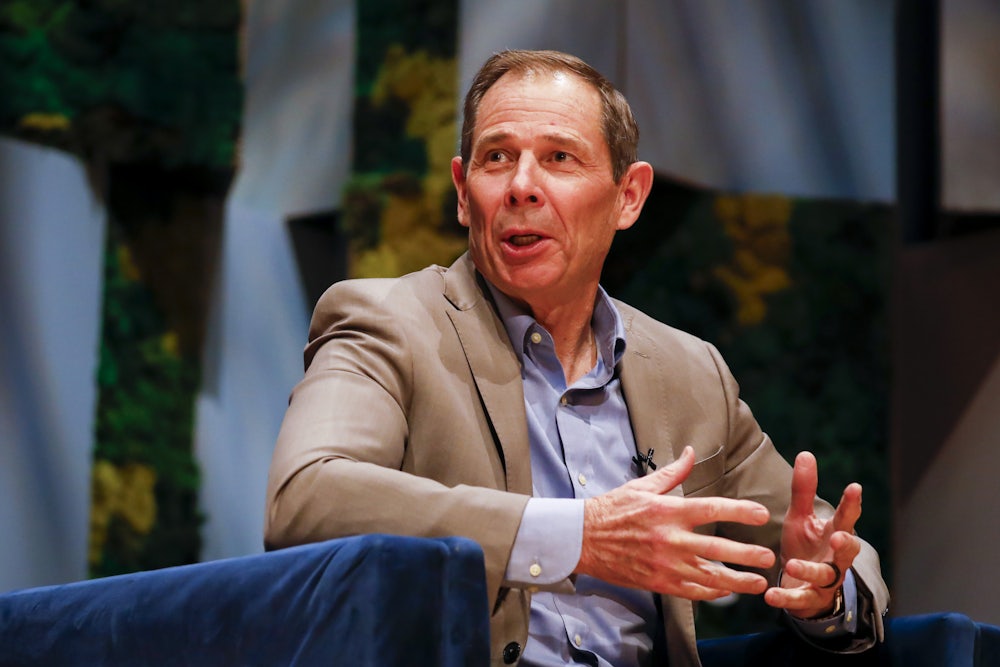Every few months, a major publication will publish a story profiling Republicans who are reportedly “evolving” on climate change—meaning shifting from hard-core climate denial to an acknowledgment of objective reality. Sometimes, these pieces will report that these Republicans support a carbon tax. Others look at GOP tree-planting plans. This quarter’s version—running in both Politico and the The Wall Street Journal—focuses on another familiar topic: a caucus with the word “climate” in its name. That the House’s three-year old, 82-member Conservative Climate Caucus has virtually nothing to show for itself doesn’t much matter. There are Republicans who are saying the word “climate”; apparently, that’s newsworthy enough.
“Despite the low marks in the eyes of many environmentalists,” the Journal writes, and the fact that none of its members voted for the Inflation Reduction Act, “the caucus represents an evolution for many Republicans on climate change.” The man behind it is Utah Congressman John Curtis, a “former shooting-range developer with an outdoorsy streak.” That’s highlighted by the paper’s photo shoot with Curtis, where he sits outside on a rock wearing jeans and sneakers. When he served as the mayor of Provo, Utah, Curtis championed “clean air issues,” though found when he got to Congress that people “wanted to talk about carbon” instead. “That was an uncomfortable topic for Curtis, whose district includes a coal and natural-gas-rich region called Carbon County.” Left unmentioned in the story is the fact that Curtis has accepted $265,000 from oil and gas industry-linked political action committees since his first congressional campaign in 2017.
Curtis is also now running for Senate, hoping to replace Mitt Romney. Curtis enjoyed a 42-point margin in his last election; a statewide seat will be more competitive and could involve winning over some more moderate voters. It wouldn’t be surprising, therefore, if one of his comms staffers were going around pitching puff pieces about his alleged environmentalism. But the genesis of this coverage is beside the point.
Politico credits Curtis with leading a “small but growing number of Republicans advocating action.” There’s a bit of a tension, this piece suggests, between their “innovation”-focused approach to climate issues—an “emerging Republican climate strategy”—and Donald Trump’s steadfast rejection of climate science. Yet these Republicans aren’t breaking ranks with Trump. They’re not reaching across the aisle to vote for climate policy and, in many cases, are in fact leading the charge against attempts to reduce emissions through both legislation and executive action.
What are members of the purportedly “growing Republican movement to engage on climate issues,” per the Journal, up to? Conservative Climate Caucus member Bill Huizenga is plotting to strike down the Securities and Exchange Commission’s recently finalized climate disclosure rules using the Congressional Review Act. He’s also taken $348,800 from PACs linked to energy and natural resource interests since first coming to Congress in 2008. North Carolina Congressman Patrick McHenry—another caucus member—similarly announced a pair of hearings to probe “this disastrous rule,” as he called it. Since his first run for Congress in 2004, McHenry has accepted $616,750 from PACs linked to the energy and natural resources sector.
There are a few reasons why Republicans might claim to care about the climate crisis. For the small minority of politicians who happen to represent the tiny sliver of congressional districts that are actually competitive, it might be a way to win over voters who care about the issue. It can help them line up lucrative gigs after their tenure on the Hill, whether on speaker circuits or in lobby shops. Republicans Bob Inglis and Carlos Curbelo—forerunners of the Republicans-who-care-about-the-climate grift—are still regularly quoted as experts on the subject. A caucus with “climate” in the name, moreover, can also be a convenient soapbox for Republicans who take money from the fossil fuel corporations to spew that industry’s talking points. Oil and gas companies have long talked up their green bona fides, and having Republicans champion their chosen set of “solutions” is likely a good deal more strategic than asking them to drone on about climate change being a hoax. The fact that these solutions—carbon taxes that won’t pass, carbon offsets that aren’t real, and industry methane initiatives that aren’t binding—aren’t solutions tends to get lost in the ensuing good press.
Fossil fuel interests and their beneficiaries in the Republican Party, in other words, have long known that they can court liberal readers by saying the words “climate change.” Reporters should know better than to take them seriously.








